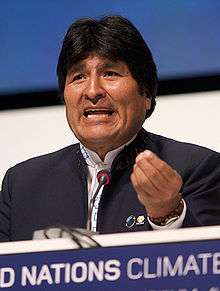Post-neoliberalism
Post-neoliberalism is a set of ideals characterized by its rejection of neoliberalism and the economic policies embodied by the Washington Consensus.[1][2] While there is scholarly debate about the defining features of post-neoliberalism, it is often associated with economic policies of nationalization and wealth redistribution, opposition to deregulation, financialization, free trade, and the weakening of labour relations, and left-wing politics more generally.[1][3]
The movement has had particular influence in Latin America, where the "Pink Tide" brought about a substantial shift towards left-wing wing governments in the 2000s.[4] According to Roger Merino, examples of post-neoliberal governments include the former governments of Evo Morales in Bolivia and Rafael Correa in Ecuador.[5]
History

The idea of post-neoliberalism arose during the Pink Tide of the 1990s and 2000s, in which left-wing Latin American critics of neoliberalism like Hugo Chavez and Evo Morales were thrust into power. According to researchers, the election of Hugo Chavez as President of Venezuela in 1999 marked a definite start to the Pink Tide and post-neoliberal movement.[6][7] Following his election, Evo Morales, Néstor Kirchner, Rafael Correa, and numerous other leaders associated with the post-neoliberal movement were elected in Latin America.
While the ideas of post-neoliberalism are not exclusive to Latin America, they are largely associated with the region.[8][9]
Ideology
Post-neoliberalism seeks to fundamentally change the role of the state in countries where the Washington Consensus once prevailed.[10] To achieve this, post-neoliberal leaders have advocated for the nationalization of numerous industries, notably the oil, gas, and mining industries in Latin America.[11] Post-neoliberalism also advocates for the expansion of welfare benefits, greater governmental investment in poverty reduction, and increased state intervention in the economy.[12]
Criticisms
Post-neoliberalism has drawn criticism from both the left and right of the political spectrum.
Right-wing critics have claimed that the term itself is vague and populistic, while also arguing that "post-neoliberal" policies harm international investment and economic development.[13]
References
- Ruckert, Arne; Macdonald, Laura; Proulx, Kristina R. (2017). "Post-neoliberalism in Latin America: a conceptual review". Third World Quarterly. 38 (7): 1583–1602. doi:10.1080/01436597.2016.1259558.
- Öniş, Ziya; Şenses, Fikret (November 2003). "Rethinking the Emerging Post-Washington Consensus: A Critical Appraisal" (PDF). ERC Working Papers in Economics. 03 (9). Ankara: Middle Eastern Technical University. Retrieved 27 August 2016. Cite journal requires
|journal=(help) - Melber, Henning; Brand, Ulrich; Nicola, Selkler. Postneoliberalism – A Beginning Debate. Dag Hammarskjöld Foundation. ISBN 978-9185214525.
- Encarnación, Omar G. (9 May 2018). "The Rise and Fall of the Latin American Left". The Nation. Retrieved 12 November 2019.
- Merino, Roger (2011). What is ‘Post’ in Post-Neoliberal Economic Policy? Extractive Industry Dependence and Indigenous Land Rights in Bolivia and Ecuador
- Iain, McLean; Allistair, McMillan (2009). The Concise Oxford Dictionary of Politics$ The Concise Oxford Dictionary of Politics (3 ed.). Oxford University Press. ISBN 9780199207800.
- Arne, Ruckert; Macdonald, Laura (2009). Post-Neoliberalism in the Americas: An Introduction. Palgrave Macmillan. doi:10.1057/9780230232822. ISBN 978-1-349-30021-1.
- Ruckert, Arne; Macdonald, Laura; Proulx, Kristina R. (2017). "Post-neoliberalism in Latin America: a conceptual review". Third World Quarterly. 38 (7): 1583–1602. doi:10.1080/01436597.2016.1259558.
The main objective of this article is to perform a critical conceptual review of post-neoliberalism to find consensus and discord in the existing literature...Although our search was not limited to literature on any specific region, the overwhelming amount of research we encountered was focused on Latin America, with little material identified through the search on post-neoliberalism in Africa or Asia.
- "http://eprints.soton.ac.uk">Grugel, Jean: Post-neoliberalism in Latin America: Rebuilding and Reclaiming the State after Crisis
- "palgrave.com"Wylde, Christopher: Latin America After Neoliberalism
- http://venezuelanalysis.com/tag/nationalization
- "http://muse.jhu.edu">Kaltwasser, Cristóbal: Toward Post-Neoliberalism in Latin America
- https://ssrn.com/abstract=1938677
External links
- A comparative review of the scholarly literature on post-neoliberalism: Post-neoliberalism in Latin America: a conceptual review